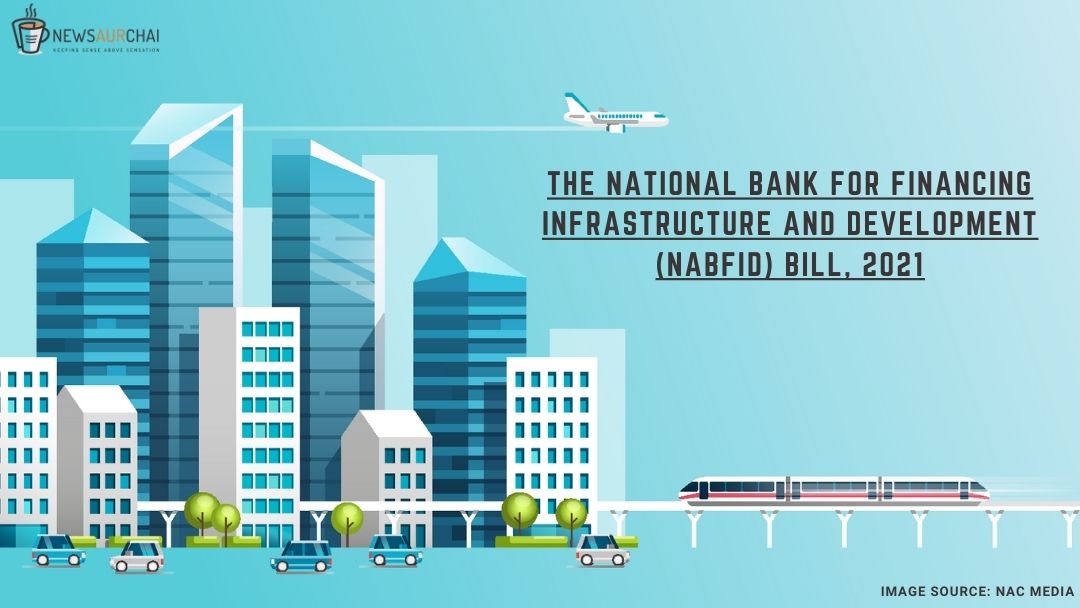
On March 25, 2021, Rajya Sabha passed a Bill, by voice vote, to establish a statutory institution called the National Bank for Financing Infrastructure and Development (NBFID). The Bill was passed after a response from the Finance Minister, Ms Nirmala Sitharaman. The National Bank for Financing Infrastructure and Development Bill (NBFID), 2021 was introduced in Lok Sabha on March 22, 2021, and was passed in the Lok Sabha on March 23, 2021.
Sitharaman stated that the Institution’s audited accounts would be presented to both the Houses every year, and they will have an “oversight”.
What Is The NBFID Bill?
The Bill aims to establish an NBFID to support ‘infrastructure funding’ in the country. This would work as the primary Development Financial Institution (DFI). It involves the development of bond and futures markets, which are essential for infrastructure financing.
What Exactly Is The National Bank For Financing Infrastructure And Development?
NBFID will be established as a statutory organization, where it will have an authorized shareholding of Rs. 1 lakh crore and financial and developmental targets. It will catalyze the infrastructure financing ecosystem and be accountable to the Parliament.
The NBFID will be administered by the Chairman and Board-nominated professionals who the Government will choose.
The shares of NBFID can be held by:
- Central Government,
- Multilateral Institutions,
- Sovereign wealth funds,
- Pension funds,
- Insurers,
- Financial Institutions,
- Banks and
- Any other institute prescribed by the Government.
Objectives Of NBFID
NBFID will have financial objectives along with developmental objectives. The financial objectives include lending, investing, or drawing investments directly or indirectly for India’s infrastructure projects, whether entirely or partially. The Central Government will state the infrastructure domain, which will determine the sectors that will be covered. The developmental objectives include facilitating the growth of the bond, loan, and derivatives markets to fund infrastructure.
Functions Of NBFID
- Extending loans and advances for infrastructure projects;
- Taking over or refinancing such existing loans;
- Attracting investment from private sector investors and institutional investors for infrastructure projects;
- Organizing and facilitating foreign participation in infrastructure projects;
- Facilitating negotiations with various Government authorities for dispute resolution in the field of infrastructure financing and
- Providing consultancy services in infrastructure financing.
What Will Be The Source Of Funds?
NBFID can obtain money by loans or other sources, in both Indian rupees and foreign currencies, or by issuing and selling a range of financial instruments, such as bonds and debentures.
It may remortgage from:
- Central Government,
- Reserve Bank of India (RBI),
- Scheduled commercial banks,
- Mutual funds, and
- Multilateral institutions, such as the World Bank and the Asian Development Bank.
What Is A Developmental Financial Institution (DFI)?
DFIs are established to offer long-term financing to sectors of the economy where the costs are too high for commercial banks and other financial institutions to bear. They do not accept deposits from citizens. Instead, they rely on the market, the Government and multilateral organizations for financing. They are often backed up by Government assurances.
Administration Of NBFID
The Board of Directors will oversee the operations of NBFID.
The members of the Board include:
- The Chairperson appointed by the Central Government in consultation with RBI,
- A Managing Director,
- Up to three Deputy Managing Directors,
- Two directors nominated by the Central Government,
- Up to three directors elected by shareholders and
- Few independent directors (as specified).
- Candidates for the position of Managing Director and Deputy Managing Directors will be advised by a body set up by the Government. On the advice of an internal committee, the Board will name independent directors.
What Is The Opposition Saying?
Opposition members strongly argued that the Bill should be sent to the Select Committee as it did not include “external oversight or surveillance” in its current form.
Senior Congress leader, Mr Jairam Ramesh, sparked off the debate by saying that the concept of DFIs had already been tried, checked, and rejected. He said, “Thirty years after Dr Manmohan Singh’s Budget, the clock has turned back and we are going back to the DFI era.” Although the Government owns a 26 per cent interest in this bank, the Bill lacks an oversight mechanism. He also rebuked the Government for failing to send the Bill to a Committee of Parliament.
Mr Manoj K. Jha, a JD MP, expressed disappointment that the Government, despite only owning a 26 per cent share, is willing to sell a 74 per cent stake.
The Bill was supported by members of the Biju Janata Dal, Telangana Rashtra Samiti, and Yuvajana Sramika Rythu Congress, among others.
What Did Nirmala Sitharaman Say?
Ms Sitharaman claimed that the NBFID was desperately needed and would be for the next 25 years in India’s development narrative. It intended to finance not only road infrastructure but also social infrastructures such as schools and hospitals. It will be a professionally managed body, with the Chairperson appointed solely by the Government. She said the Bill enclosed safeguards such as requiring the NBFID to send a copy of its balance sheet and accounts, as well as a copy of the auditor’s report and a report on the Institution’s activities during the relevant year, to the Central Government and the RBI within four months of the date on which its accounts were closed and balanced. Every year, these reports will be presented to both Houses of Parliament.
Nirmala Sitharaman said, “Parliament’s oversight annually is envisaged and built into the Act itself.”






One Comment